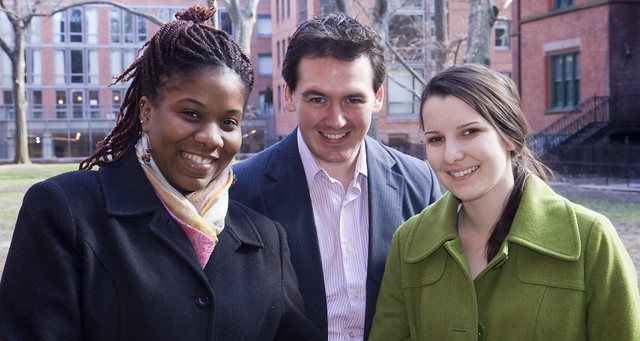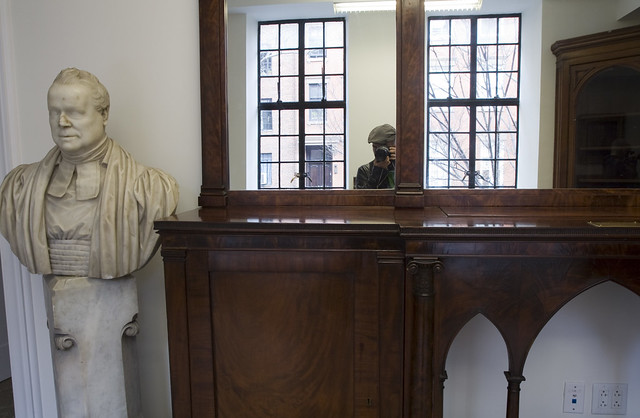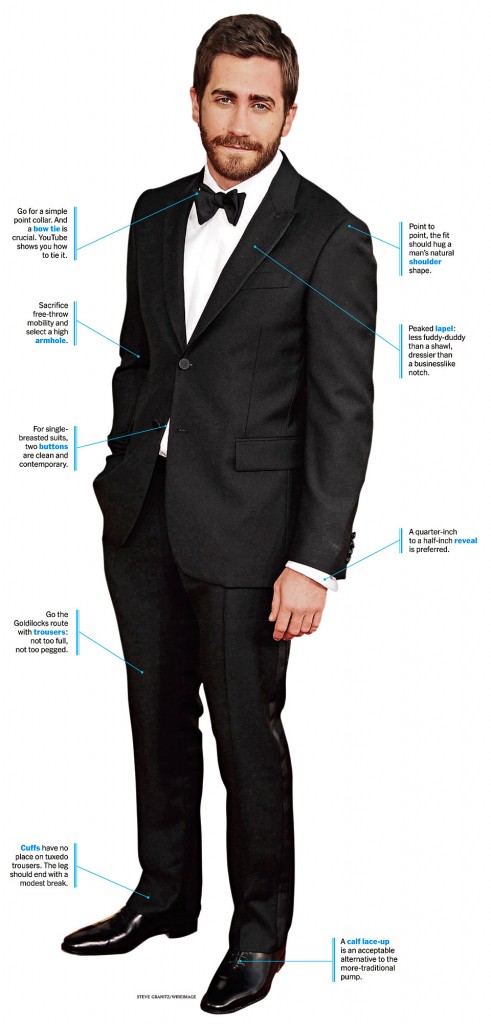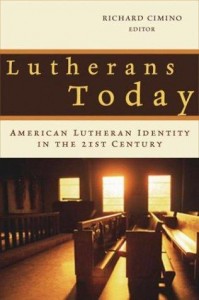
General Theological Seminary, New York City. February 17, 2012
365 Part Deux



 I saw this last night and I’m seeing it explode on the internets so I felt like I should get on the ground floor here. The Lutheran Insulter: get insulted by Martin Luther daily. Like a friend of my said – Luther was sassy.
I saw this last night and I’m seeing it explode on the internets so I felt like I should get on the ground floor here. The Lutheran Insulter: get insulted by Martin Luther daily. Like a friend of my said – Luther was sassy.
 On Sunday night, I felt my kidling kick.
On Sunday night, I felt my kidling kick.
That was wild.
With K 21 weeks along, I didn’t expect to feel the little guy quite yet. She keeps telling me that the little guy is moving around (especially when it’s time to go to bed). And there it was! Right there! Kicking! And I could feel it! And then I got to tell it to settle down cuz mom’s gotta sleep.
I have a feeling that last bit will become old hat pretty soon.
 With it being the second day of Lent, my Facebook news feed is blowing up with reflections on yesterday. Piety, love, God, Jesus, dust, ash, etc! There are status updates galore from my Episcopalian friends who spent their entire days standing in subways, going to firehouses and police precincts, giving ashes to those who requested it. Sore thumbs, it seems, is the name of the game. But not only are ashes being talked about, but sermons, fasting, and all that we’re giving up for Lent, is dominating my feed. And even I, very briefly, got into the act. In a way, I am part of the “problem”.
With it being the second day of Lent, my Facebook news feed is blowing up with reflections on yesterday. Piety, love, God, Jesus, dust, ash, etc! There are status updates galore from my Episcopalian friends who spent their entire days standing in subways, going to firehouses and police precincts, giving ashes to those who requested it. Sore thumbs, it seems, is the name of the game. But not only are ashes being talked about, but sermons, fasting, and all that we’re giving up for Lent, is dominating my feed. And even I, very briefly, got into the act. In a way, I am part of the “problem”.
But, lo and behold, I’m back to my old self today by posting, on facebook, on how to wear a tuxedo (i.e. IT SHOULD FIT). I think I’ll point to the gospel reading from yesterday as the reason why this needs to be shared: someone’s olive oil is someone else’s formal wear and just because you gave up eating cookies or refined sugar doesn’t mean you have to look like it, amirite?
Last week in New Testament, we were talking about the differences between Paul’s letters and some descriptions in Acts. The class split into groups and were given the task to either look at Paul’s conversion experience or the Apostle Throwdown in Jerusalem and Antioch. I, luckily, got assigned the Apostle throwdown – Galatians 2 and Acts 15. And, then, after our groups met and chatted, we had our own in-class throwdown. Sadly, no metal cage descended down from the ceiling but I was surprised to find that, at least vocally, my view of the throwdown differed from others because I take Paul’s view much more seriously than Acts. And that made me, in some way, the outsider – or at least the outsider willing to vocalize an outside view.
Now, I don’t mind that one bit and I’ll admit that, before that little exercise, I never had compared the two descriptions of the events. It just had not showed up on my radar. But I think the major difference, at least in how Paul describes the events, relates through Paul’s use of Peter’s name. In Gal 2:7, Paul uses Peter; in Gal 2:9, Paul switches to Cephas. Is Paul just flipping back and forth between Peter’s names because Paul and Peter are so close, Paul uses all of the versions of his name? Maybe….but, well, I don’t think so. Instead, Paul is calling Peter Cephas for a reason – he’s explicitly labeling Peter as the “other” to the gentiles of Galatia. It is Paul’s way of showing his authority (which is why he never calls himself Saul). Peter is labeled as different, the other, the one called to preach to the circumcised, not the gentiles. His authority, in the matter of Galatia, is different from Paul’s – and this is a difference that was sanctified not only by the apostles in Jerusalem but by the ultimate authority, Jesus. And even though Paul describes his logic throughout Galatians 2, he really didn’t have to. The fact that he called Peter Cephas laid this all out well enough.
In essence, Paul is a gamer; a baller; a playmaker. Paul is playing rhetorical hardball right here. He is willing to throw it down, and, in a sense, defend his house. And I like the idea of a Paul who’s willing to throwdown. But should I really trust Paul’s vision of the throwdown since he’s speaking to a people where he had to throw around his authority? Maybe not. I should probably consider his explanation with a huge grain of salt. But that willingness to throw his weight around, his cattiness, that willingness to fight? That feels more real to me and it’s why I give Paul’s point of view more weight than Acts. Is that one of my biases? I think so.
 Last week, I finally discovered the “Lutheran” sections at General’s library. I am a little embarrassed it took me this long to find them – and it took my wandering around the library while looking for a book on Christian ethics to literally walk into them. One entire section, dominated by Martin Luther and his haters and lovers, another section devoted to old books still classified in the Dewey system (like an 1898 copy of a Lutheran cylopedia and a graduate thesis written in the 1930s, and paid by the WPA, to categorize the historical writings and artifacts located in Lutheran churches in New York). The third section, located near the back, marked BX8000 or so, is all about modern day Lutherans. And it was there that I stumbled onto the book Lutherans Today: American Lutheran identity in the 21st Century. Written in 2003, the book is a tad out of date (the Call to Common Mission is the focus of most of the arguments with the threat of the human sexuality statement looming in the background) but I’m really enjoying it.
Last week, I finally discovered the “Lutheran” sections at General’s library. I am a little embarrassed it took me this long to find them – and it took my wandering around the library while looking for a book on Christian ethics to literally walk into them. One entire section, dominated by Martin Luther and his haters and lovers, another section devoted to old books still classified in the Dewey system (like an 1898 copy of a Lutheran cylopedia and a graduate thesis written in the 1930s, and paid by the WPA, to categorize the historical writings and artifacts located in Lutheran churches in New York). The third section, located near the back, marked BX8000 or so, is all about modern day Lutherans. And it was there that I stumbled onto the book Lutherans Today: American Lutheran identity in the 21st Century. Written in 2003, the book is a tad out of date (the Call to Common Mission is the focus of most of the arguments with the threat of the human sexuality statement looming in the background) but I’m really enjoying it.
In the chapter “Goliaths in Our Midst,” the story of megachurches in the ELCA, there was a description of how new members were received at Community Lutheran Church in Las Vegas that fascinated me – and something I’m probably going to steal for my future ministry. When new members are received, they do not just stand in front of the congregation by themselves. Rather, the members of the community who invited them to church are brought up there as well. It’s a nice twist on an idea that I previously heard about including new members into the community in a group so that those people would have each other to draw support from. Community Lutheran takes that idea a step further and expand their circle by including those who enjoy the church so much that they invite others to attend. I really like this idea and I think it might have a valuable place in a church’s community life – thought it might fly right into the face of stereotypical Lutheran shyness.